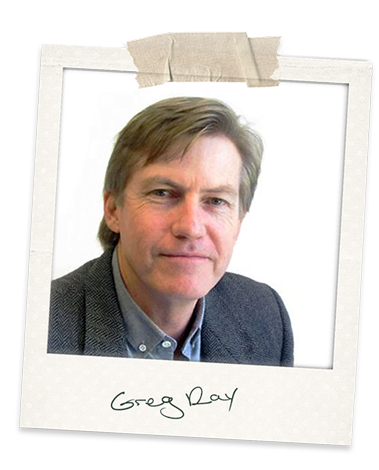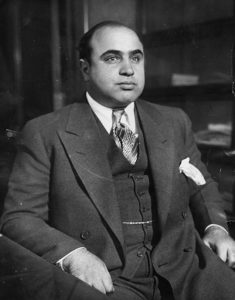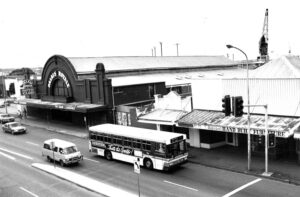My wife and I were talking the other day about our patchwork employment histories. I’m lucky I wound up, eventually, with a job I loved. I sure had a lot of jobs I didn’t love.
The first “job” I ever had was selling programmes at Newcastle Rugby League matches. I think I was still in primary school, and I got the job because a classmate’s father produced the programmes and maybe had something to do with the league competition.
The idea was to earn some pocket money, since my official family pocket money had been indefinitely suspended after I broke a glass ornament in the bathroom. (I had flicked at a fly with my towel, which hit the tall vase-type thing and sent it smashing onto the tiles.)
Not sure why I wanted money, but selling programmes wasn’t the best way to earn it. For selling one program for 40 cents I got five cents commission. Now and then I got a tip, usually from a drunk spectator who didn’t wait for change. Before the game and in its early stages I would wander around with my bundle of shiny new programs and my little apron with a cash pouch calling out “Programmes! Get your programmes here!” Almost all sales were made before the match, naturally, and the rest of the day until the final whistle was pretty boring, all the more so because I didn’t have any interest in football.
What I knew about football was that my father played it. He was a good goal-kicker, apparently, and pretty quick on his feet. I didn’t go to watch him play, but I saw him when he got home late in the afternoon, bruised and groaning. He would make up a hot bath with mustard powder in it and just lie there feeling sorry for himself. That was football.
Anyway I have a confession to make. Sometimes, at the end of a long boring match people would leave their programmes on the benches and now and then I actually picked up one or two particularly pristine-looking copies and returned them to my pile of “unsold” copies, pocketing 40 cents from my apron-pouch. (Sorry Leigh ☹.) I guess I was a bad kid, underneath the Leave-it-to-Beaver innocent façade.
My next “job” was “helping” my Uncle Terry and Aunty June at their petrol station in Newcastle West. They hired me as a favour, I’m sure, and whatever they paid me was too much. My job was helping customers fill up, cleaning windscreens, detailing cars that were left for washing, cleaning the toilets and doing little tasks for Ronnie, the mechanic. What struck me was how endlessly busy my uncle and aunt were at work. It was all go. I found it hard to imagine working that hard all day, every day.
My dad had a job at the Sulphide Corporation’s lead and zinc smelter at Cockle Creek, and he had some kind of contact through which, at some point in my high school career, he got me a holiday job as a labourer at a nearby metal fabrication business, A.B. Rea. This job took boring to new heights, but with the added disadvantage of being hard and heavy work. I don’t even really remember what I did there but it paid enough for me to buy the Tasco astronomical telescope I coveted at the time.
When I left school and had no idea what I wanted to do for a career – other than a vague idea I might like to be a journalist – it was assumed I would go to university but I didn’t know what to study. I had too many options. Commerce, economics and law were beckoning with the promise of steady employment though nothing about them excited me. I couldn’t bring myself to study what I loved – writing – because that would have been “throwing my good marks away”.
Robbing the bank
The Commonwealth Bank was willing to employ me and put me through a degree in commerce. I worked for the bank for maybe a month. It was terrible. I don’t remember much about it except I could never get the postage tin to balance. Every day it was either a few cents over or under what it was supposed to be. I also remember people bringing in huge money boxes full of coins to be counted. As the junior in the branch this special agony was mine to enjoy. Counting and wrapping hundreds of coins is not an interesting pastime. One day the boss, for no apparent reason, took me into the vault. He thrust writing pads, pens and other stuff into my hands and told me the great truth of working in a bank. You could steal anything from the bank, he said, except money. (I wasn’t going to, honestly.)
Then I got offers from elsewhere. I did OK in the NSW Public Service exam, so the NSW Magistrate’s Court offered me a job where I would have been paid while I studied law in Sydney. For reasons that I cannot fathom today I turned down that offer. Instead I opted to go for full-time economics-law at ANU in Canberra. This did not end well and I “deferred” after a couple of years. I failed economics in first year and switched to straight law. I then failed my family law elective (after having numerous stupid arguments with my lecturer when I should have just shut my trap) and deferred. The thing was, I knew I wouldn’t finish the degree but didn’t want to admit that to my parents.
While I was studying, however, money was very, very tight. My dad got me another vacation job at the smelter, back in Newcastle. This was as a labourer on the “clean-out crew”. Once again it was really hard physical work. Most of the week you just did general work around the smelter. This might be hosing roads, cleaning toilets, shovelling ore, cleaning fans with high-pressure water jets or anything else the foreman could find you to do.
Lead smelters are not the healthiest places to work. You were supposed to wear a respirator pretty much all the time, but most of the other labourers thought they were sissy and wouldn’t wear them except when the bosses were looking. That meant their blood lead levels went up and up. I wore my respirator a lot of the time, but my lead level still went from 11 to 25 micrograms per decilitre in the months I worked at Sulphide. Heaven knows what the other guys’ levels were.
The clean-out crew had one special job. Once a week (I think) the smelter had to be shut down so all the built-up muck inside the furnace could be removed. It was a massive metal vessel with a number of refractory brick panels at a certain level. On clean-out day we had to bash these doors in and clean out the furnace. It was still as hot as hell. It was like a big steel swimming pool full of molten metal and when we bashed the brick doors in, the broken masonry floated on the molten metal and we had to rake it out of the doorways (about waist-height) and into metal wagons. The important job was done with pneumatic jackhammers that had four-metre bars. We poked these into the oven-like vessel and chipped the build-up from the ceiling and walls, knocking it into the molten pool before raking it out and wheeling it over to the dross recycling plant. We wore full protective gear and the sweat ran off us like rivers. We worked half-an-hour on, half-an-hour off and drank Staminade in a cool-room during our downtime.
A hundred ways to get hurt
There were hundreds of ways to get hurt at Sulphide. People got burns from molten metal. Things fell on people. The acid plant was a maze of pipes carrying concentrated acid around and you could get plenty of shifts there if you were willing. You wore yellow plastic rain gear and if a pipe leaked on you the idea was to sprint to one of the green fluoro lights that marked a “safety shower’. You got under, ASAP, and washed off the acid before any harm was done. Ideally. The cadmium plant was dangerous too. One bloke told me that, if I took a shift there, I should watch out for puffs of orange dusty stuff. If the system leaked and this stuff came out and you took a breath you’d be sterile. Two breaths and you’d be dead, he reckoned. He might have been kidding, but there were no queues for shifts there.
Everything was heavy. The first day on the job I could hardly lift the jackhammer. By the time the job finished and I went back to uni I was the strongest I’ve ever been. I remember maybe my first day back at uni I saw a guy struggling to drag a tea-chest full of his books and gear from his car to his dorm room. I walked right up, lifted that box in a bear-hug grip and carried it for him. I remember him looking at me amazed. It was good to be so strong, but not worth the awful job. To be fair, the pay was extremely good by the standards of the day.
After I deferred uni my plan was to stay in Canberra. I still hoped to be a journalist but all my job applications got returned. In my back pocket I had a letter promising me a job in the Commonwealth Public Service any time I turned up and asked (I’d done their exam too, and got a good mark.) But Canberra was such a public service town I had it in my head that I wanted to be different and work in private enterprise. This was easier said than done. A couple of days door-knocking in the industrial area got me half a day’s work carrying sofas for a furniture seller. Nothing else.
I tried selling Amway door-to-door. I answered job ads in the paper from people with all kinds of ideas. One person was marketing ashless car ashtrays that plugged into your car’s inlet manifold. He wanted sales reps. Another person wanted somebody to sell blocks of land on Queensland’s Darling Downs to Canberra buyers. I tried that for a short time but when I finally had a customer interested in buying I got to like the guy and found myself unable to really recommend the product to him after all.
Then there was telephone canvassing, and I found a niche for a while. You could work for $4 an hour or for a $5 commission on each sale. I took the commission option and went hard, earning good money, with sales bonuses. You turned up at a room full of phones, somebody handed you a page from a phone book and you started calling. We were warned about the “Z factor”. The theory was that anybody with a Z in their surname would be too hard and ought to be skipped. One night I called a number and got an old lady who was really upset. She’d had her eyes operated on and couldn’t see. She had nobody to talk to and was grateful for my call. We talked for a fair while and I promised to call her whenever I was working. I did too. Then I got a plummy bloke who told me off for invading his privacy. I told him that some people valued my calls and next thing he said he was an academic studying loneliness in Australian cities and would I tell him more. I said I was too busy and hung up.
Just a shit-kicker
The guy that was running the phone sales campaign got me a job as a “trainee manager” at a dry-cleaning business. Turns out I had to learn every part of the job from the ground up, and also be as efficient as the best operators. I had no hope. The Greek ladies and Vietnamese guys were better and faster than I could ever hope to be, so I lost that job and wound up trying to sell kitchen sinks for a company called Fred Clark Australia. Jill and Wally told me I was overqualified for their job but gave me a start. I went OK until one day, frustrated at intense questioning on the phone from a customer, I told them I was “just a shit-kicker” and they would have to go higher to get their questions answered. That was the end of my kitchen sink career.
With my tail between my legs I went, defeated, to the public service office and handed over my job offer letter. Next thing I knew I was in the office of the Australian Federal Police as a claims examiner, checking invoices to see whether they ought to be paid. Once again, things did not go well. It was a pleasant enough workplace, the conditions were cushy and the job was easy but my immaturity and lack of people skills didn’t help me much. I stuffed up so many ways. I didn’t join the clique around the middle manager. Big mistake. Then I thought I would be clever and took on a massive old problem file called “Operation Plover” which involved reconciling the accommodation and meal expense claims of police officers who had provided VIP protection at some big event in Brisbane. I soon found out why nobody wanted to touch this file. It was very difficult to find reasons why some of the claims should be paid, but equally difficult to say they shouldn’t.
I got banned from driving the AFP’s cars after a very silly episode. One of my jobs was to drive a stack of computer print-outs to a building across town known as Bligh House. One day I got there, parked in the spot marked “AFP” and took the printouts in. When I came out somebody had parked me in. I found a way out over the rose garden, after moving a motorbike that was parked next to me. A day or two later the same thing happened. Really annoyed, I left an abusive note on the windscreen of the car that parked me in. When I got back to the office the boss was waiting for me. Had I been to Bligh House? Yes. Where did I park? In our AFP parking space, I said. Turns out the Australian Federal Police didn’t have a parking space at Bligh House, but Agence France Press did. Grounded for good. Somebody had to make an apology to the AFP on behalf of the other AFP. Eventually, having gotten offside with my bosses, I was exiled to Civic police station to accept payments for Canberra’s new traffic fine system. Not a promotion. At a certain point, when I realised this was not a good department for me to work in, I applied for a transfer and spent exactly one day working for the Department of Trade.
Before my transfer I had been alerted by my mother to an advertisement back in my home town of Newcastle, calling for cadet journalists on the local paper, The Newcastle Herald. Of course I applied. I put everything I had into that application. I gave them things they asked for, plus a lot they hadn’t. When I got an interview I was beside myself. It was an interview and some tests on general knowledge, I think. When I got word that I had been accepted it was like I was getting out of jail. Out of Canberra. Out of the public service. Into journalism, at long last. It was a whopping pay cut. First year cadets aren’t well-paid workers. But to be honest that was the last thing I cared about right then.



